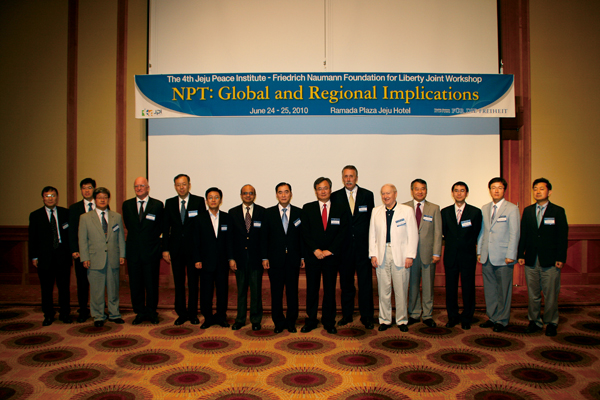
- Updated 2024.5.14 17:13
- All Articles
-
member
icon
-
facebook
cursor
-
twitter
cursor
|
NewsLocal news |
Debating the nuclear futureWorkshop addresses non-proliferation |
|
| |
 |
|
| ▲ Participants during the 4th Jeju Peace Institute - Friedrich Naumann Foundation for Liberty Joint Workshop. Photo by Lim Sung-eun, Friedrich Naumann STIFTUNG |
On June 25, exactly 60 years after the start of the Korean War, Jeju Island hosted a group of senior statesmen and academics from around the world for the 4th Jeju Peace Institute - Friedrich Naumann Foundation for Liberty Joint Workshop. The theme for the workshop was the global and regional implications of the Non-Proliferation Treaty, and papers were presented addressing the American, European, Indian and ASEAN global perspectives on the treaty, as well as Korean, Russian, Chinese and Japanese regional viewpoints. Not surprisingly, the sinking of the Korean Navy corvette Cheonan in March, which an inquiry judged to have been caused by a North Korean torpedo, featured prominently in the discussions, as did the future of the six-party talks on North Korea’s nuclear weapons program.
Representing the joint hosts, Han Tae Kyu, president of the Jeju Peace Initiative, opened the workshop and Walter Klitz, resident representative for the Naumann foundation, welcomed the participants. In his keynote speech, the Deputy Foreign Minister for Political Affairs, Lee Yong Joon said the workshop was both “timely and meaningful.” He said that the Republic of Korea, as the world’s fifth-largest nuclear operator, “attaches great value to the peaceful uses of nuclear energy.” The 2010 Nuclear Security Summit was held in Washington on April 13 and South Korea will host the next in 2012.
Much of the livelier discussion on the NPT itself revolved around its current significance. Prof. Brahma Chellaney of the New Delhi-based Center for Policy Research, presenting his paper titled “The Future of the NPT,” said that the treaty regime was facing a “crisis of confidence” and had been for a long time. In the discussion section following the morning session, he said the world is now in a post-NPT world, partly because the treaty covers so few countries and because it cannot be amended. “Let’s not tinker with a treaty that is so rigidly structured and is anchored in a different era,” he said.
Han In Taek, an associate research fellow with the Jeju Peace Institute, initially referred to the NPT as “a naked emperor” but later pointed out that China and Russia still attach great significance to the treaty so it was too soon to treat it as “already dead.”
Ambassador Brian McDonald, who heads the European Commission to the Republic of Korea, reaffirmed the European Union’s commitment to the goals of the NPT. “The position of the European Union is that in the context of new security threats the NPT, based on the three mutually reinforcing pillars of non-proliferation, disarmament and peaceful uses of nuclear energy is more important than ever,” he said.
Tang Siew Mun, director (Foreign Policy and Security Studies) at the Institute of Strategic and International Studies in Malaysia, presenting ASEAN’s perspective on the future of the NPT, said a nuclear-free world was an issue on which the ASEAN countries are united. Prof. John Endicott, president of Woosung University in Daejeon and a two-time nominee for the Nobel Peace Prize, commended President Barack Obama for referring to the NPT as “the center-piece of my foreign policy.”
The workshop participants also spoke at length on the resumption of six-party talks between the Democratic People’s Republic of Korea (as North Korea calls itself), the ROK, China, the United States, Japan and Russia. The Chinese workshop participant, Dr. Zheng Jiyong of the Institute of International Studies at Fudan University, had to cancel because of a conflicting commitment but had already submitted a paper, which, as moderator of the afternoon session, Klitz entered into the proceedings. Several of those present expressed disappointment that Zheng was not available as there were parts of his paper they would like to have questioned him on. His paper concluded that, “The core of [the] nuclear issue in East Asia is the resolution of North Korea’s nuclear crisis,” a statement that all appeared in agreement with.
The workshop was intended as a forum to analyze the NPT and its implications and as such was a venue for discussion rather that to formulate policy. What was apparent was that the issue is enormously complex but the debate generated bodes well for the 2012 Nuclear Security Summit.
|
|
|
|
|
|
|
|
ⓒ Jeju Weekly 2009 (http://www.jejuweekly.net)
All materials on this site are protected under the Korean Copyright Law and may not be reproduced, distributed, transmitted, displayed, published without the prior consent of Jeju Weekly. |
|
|
|
|
| Jeju-Asia's No.1 for Cruise |
|
|
|
Title:The jeju Weekly(제주위클리) | Mail to editor@jejuweekly.net | Phone: +82-64-724-7776 Fax: +82-64-724-7796
#503, 36-1, Seogwang-ro, Jeju-si, Jeju-do, Korea, 63148
Registration Number: Jeju, Ah01158(제주,아01158) | Date of Registration: November 10,2022 | Publisher&Editor : Hee Tak Ko | Youth policy: Hee Tak Ko
Copyright ⓒ 2009 All materials on this site are protected under the Korean Copyright Law and may not be reproduced, distributed, transmitted, displayed, published
without the prior consent of jeju weekly.com.

|




















